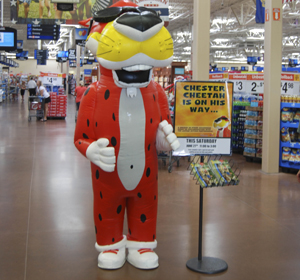Mascots like Herbie Husker are thought to bring good luck. A Munroe-Meyer Institute researcher hopes the lovable inflatable characters can also bring jobs for young adults with autism.
Keith Allen, Ph.D., professor of psychology, began to explore the possibility after Signs and Shapes owners Lee and Scott Bowen approached him last year. The company, which rents inflatable characters in Omaha, got the idea from an individual with autism who thoroughly enjoyed his experience as a mascot.
 |
A grant from the Autism Action Partnership funded a study to determine if young adults with autism could work as inflatable mascots like Chester Cheetah. Individuals with high-functioning autism are severely underemployed, said Keith Allen, Ph.D., professor of psychology in UNMC’s Munroe-Meyer Institute. |
The seven to 10-foot tall inflatable acts as social insulation from a sometimes chaotic environment.
Seven individuals with higher functioning autism ages 16-21 participated in the study, made possible through a grant from the Autism Action Partnership, formerly the GWR Sunshine Foundation.
The participants acted as promotional characters Rocky Raccoon at Sam’s Club, and Chester Cheetah for Frito-Lay at Wal-Mart.
Videos trained them to wave, shake hands, high five and hug, among other skills. They did so well the project has been expanded to include FirePal, a mascot who teaches fire safety to public school children.
|
In an innovative move, the research team chose to visually prompt the participant with I-pod and I-phone technology placed inside the inflatable.
“The participant went from responding to 60 percent of the cues to 85 percent,” Dr. Allen said.
Study participants unanimously enjoyed the activity and said they would do it again, although some weren’t sure they’d do it for a living. Still, the results encouraged Dr. Allen.
“It’s all about creating opportunities,” he said. “The more opportunities there are for adults with autism, the better their chances are to find work and contribute to society.”
The plan is to expand the program beyond Omaha with the help of Signs and Shapes, Frito-Lay, Wal-Mart and the Autism Action Partnership.